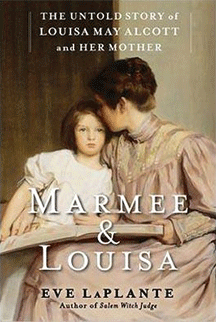By Carey Wall
That is, Abigail May Alcott and Louisa May Alcott, the writer who grew up in poverty, with charity to her family from her mother’s relatives because her philosopher father, Bronson Alcott, refused to be sufficiently realistic to support his wife and children, and became the most popular writer of her time, making more money than any male writer of the period. La Plante, an historian, writes against the perception that Louisa’s celebrated father, friend of Thoreau, Emerson, Longfellow, and Whitman, must have been the formative and nourishing influence on her. Louisa said, “A philosopher is a man up in a balloon with his family and friends holding the ropes, trying to haul him down.” Here is La Plante’s statement of her case:
“In the end, Louisa May Alcott was her mother’s daughter. As willful, valiant. And loving as Abigail, she lived out her mother’s hopes and fulfilled many of her mother’s dreams. Neither woman achieved all she desired, but together they paved the way for modern women. Both wanted equal rights, but neither could find a way to live as men’s equal. . . . Failing to create an egalitarian or satisfying marriage, Abigail leaned on her daughters for emotional and financial support. Louisa’s decision to behave like a man in the world left her, ironically, lonely and dependent on her mother. . . .In a better world, Louisa believed, women would have the opportunity to work and be heard in the world, to ‘try all kinds’ of lovers, to raise families, and to share the burdens and pleasures of domestic life. In short, they would be equal to men.”
As for influence: “A woman can accomplish as much as a man, Abigail had told her daughters so often they came to believe her. Educate yourself up to your senses. Be something in yourself. Let the world know you are alive. Push boldly off. Wait for no man. Have heads full of new and larger ideas. And proceed to the great work God gives humanity.”
The argument persuades—LaPlante covers decades sequentially—but Abigail remains largely at a distance, talked about rather than talking, especially with reference to those directives she is said to have given her daughters. That distance may be the result of the action her husband and Louisa took after her death on the diaries Abigail kept annually for decades, destroying entries and modifying others. Especially in the first half of the book, LaPlante gives us Abigail’s own words about the wretchedness she suffered from Bronson’s irresponsibility. (Read the text for Bronson’s wonderfully ridiculous—from a distance—self-assessments and explanations.) But Abigail must have suffered, too, from internal conflict for LaPlante reports she tended to idealize Bronson just as Bronson idealized himself. She cites Abigail writing that her relatives should set aside money regularly for Bronson’s family so they could forward it regularly, knowing that the family needed money regularly. Because he was Abigail’s brother and the relative to whom she was most close, there is a good deal here about Samuel Joseph May, a central abolitionist and advocate for the rights of women. He was often the source of help.
I learned from this book that in the nineteenth century in America a man owned his wife and children, and that a husband could take his divorced wife’s children away from her, a strong reason for a woman not to divorce. Not only could a woman not vote and not own property, she could not speak in public.
The second half of the book concentrates on Louisa. As a teenager, she vowed to herself and others that she would do something wonderful and become the support of her family. By the age of thirty-five she had worked hard, sewing, cleaning, nursing, and writing, for twenty years. She still occasionally requested help for her family. After that, her career took off, and she achieved her goal handsomely despite suffering poor health always after contracting typhoid fever while nursing in Washington, D.C. during the Civil War. She wrote a lot of “rubbish,” her term, as well as Little Women and her associated books because her social criticism did not entice her publishers. She wrote thrillers with brash women fighting for power with men in much the way Faulkner later for periods abandoned Mississippi for Hollywood, to feed, clothe, and house the family. She and her mother had the closest of ties, and Louisa felt, when her mother died, that she no longer had a reason to live.
Carey Wall is professor emerita in the Department of English and Comparative Literature at San Diego State University. San Diego State University is home to the Nu of California chapter of Phi Beta Kappa.




